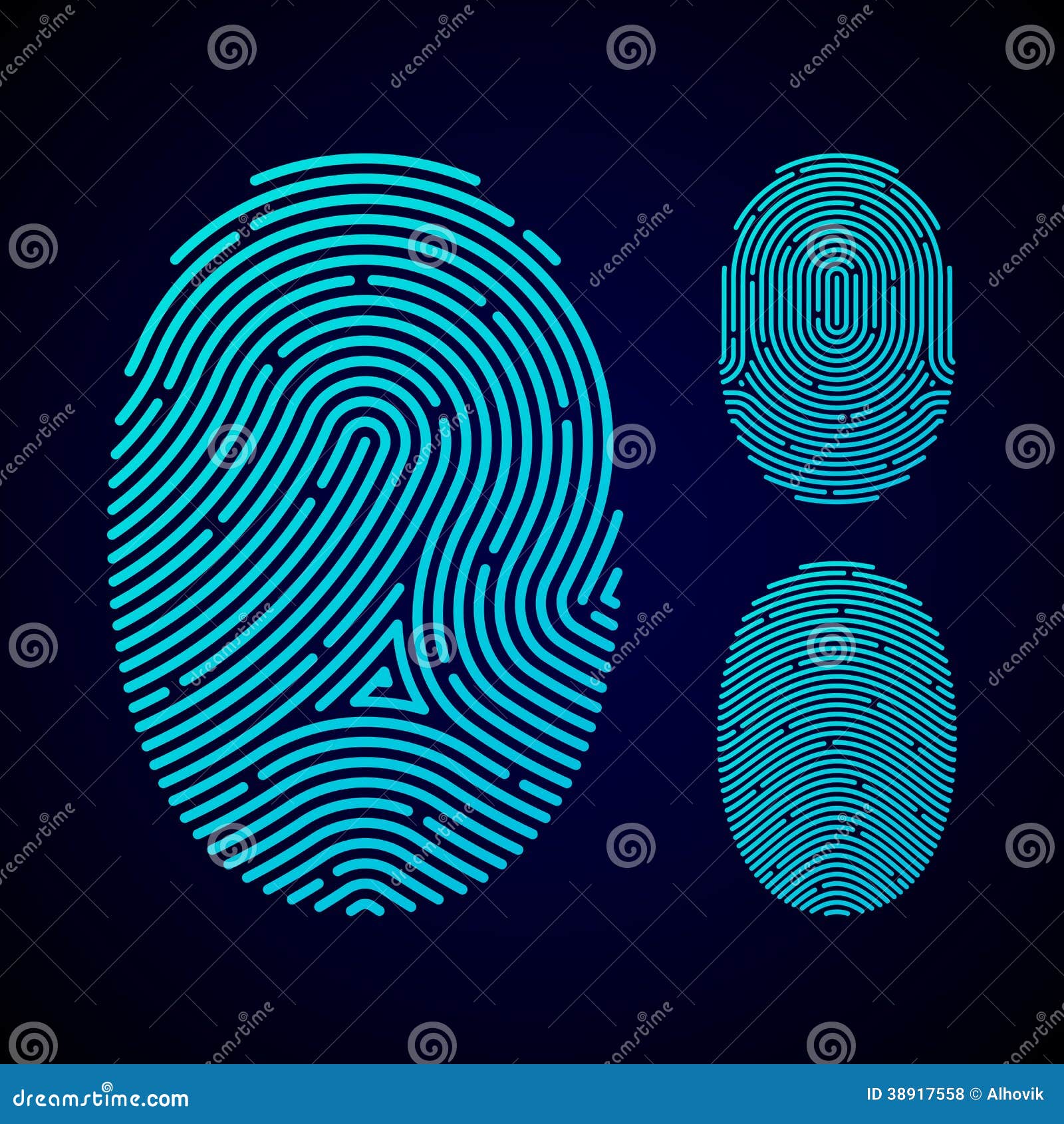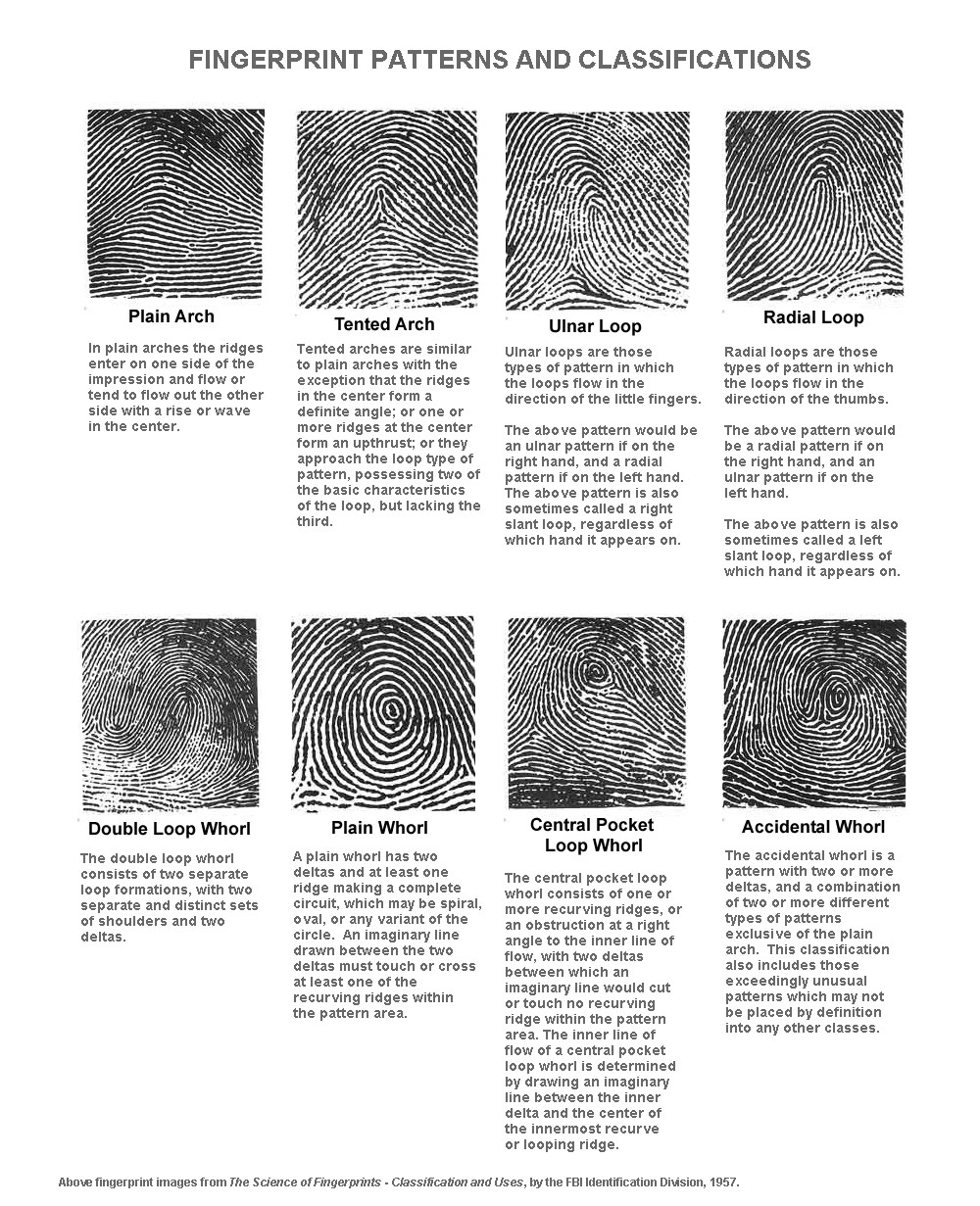Types Of Fingerprint Patterns
Types Of Fingerprint Patterns - Web types of fingerprint patterns. Friction ridges are defined by the scientific working group on friction ridge analysis, study and technology (swgfast) as “a raised portion of the epidermis on the palmar or plantar skin, consisting of one or more connected ridge units”. Web crime scene investigator, rebecca hooks, explains the different fingerprint patterns. Web the fingerprint patterns categorized into different types based on the shapes, lengths, joining and turnings. In a whorl fingerprint, the ridges form a circular pattern. Loops are the most common type of fingerprint, accounting for around 60% to 70% of all prints. The three main types of fingerprints are separated into multiple categories within each category. Check history and development of fingerprint Web types of fingerprint patterns. The pattern area is that part of a loop or whorl in which appear the cores, deltas, and ridges with which we are concerned in classifying. Whorls make up about 35 percent of pattern types. Whorls have at least two deltas and a core. Recurving ridge is one ridge that creates an inverted ‘u’ shape. In fingerprint patterns, the outermost line of the encloses pattern area, delta, core. Each type is unique and can be used to identify someone to grant them access to sensitive information and secure areas. Web we've explained fingerprints in detail, including their history and importance, all while focusing on different types of fingerprint patterns. Arches are the simplest configuration, loops extend to one side of the digit, and whorls have a concentric pattern of ridges at their core. Web verifinger sdk 21 is a commercial fingerprint identification software development kit that has fast and reliable fingerprint matching performance. Web the primary fingerprint patterns are arches, loops, and whorls, and the diversity among them arises due to the way the ridges flow and recurve. Web understand what a fingerprint is, examine the characteristics and ridge patterns of fingerprints, and identify the types of fingerprints. Friction ridge patterns are grouped into three distinct types—loops, whorls, and arches—each with unique variations, depending on the shape and relationship of the ridges: However, specific patterns can be seen in fingerprints. Some arches look like they have a pointed tent shape. In fingerprint patterns, the outermost line of the encloses pattern area, delta, core. Web the most common types. The common terms that are used in fingerprint patterns are: Friction ridges are defined by the scientific working group on friction ridge analysis, study and technology (swgfast) as “a raised portion of the epidermis on the palmar or plantar skin, consisting of one or more connected ridge units”. Web verifinger sdk 21 is a commercial fingerprint identification software development kit. Web types of fingerprint patterns. Web people have various types of fingerprints, including loops, whorls, and arches. Web we explore the eight primary types of fingerprints each with their own set of intricate patterns, characteristics & varying commonalities. By the shapes and contours of individual patterns, by noting the finger positions of the pattern types, and by relative size, determined. Web types of fingerprint patterns. An arch doesn’t have any delta, lines, or cores. Web verifinger sdk 21 is a commercial fingerprint identification software development kit that has fast and reliable fingerprint matching performance. Recurving ridge is one ridge that creates an inverted ‘u’ shape. Only a few, that is close to 5% have this type of fingerprint. Only a few, that is close to 5% have this type of fingerprint. The loop is the most common type of fingerprint. Loop type based on opening towards forearm bones (radial and ulnar loops) a loop fingerprint is broadly subcategorized into radial and ulnar loops. Learn about arches, loops and whorls with dynamic graphics to make iden. Web the fingerprint. The common terms that are used in fingerprint patterns are: Whorls have at least two deltas and a core. The three main types of fingerprints are separated into multiple categories within each category. Web based on the pattern, fingerprints can be categorized into four types arch, loop, whorl, & composite. In fingerprint patterns, the outermost line of the encloses pattern. The loop is the most common type of fingerprint. The pattern area is that part of a loop or whorl in which appear the cores, deltas, and ridges with which we are concerned in classifying. Learn about arches, loops and whorls with dynamic graphics to make iden. Whorls make up about 35 percent of pattern types. Web the fingerprint patterns. Each type is unique and can be used to identify someone to grant them access to sensitive information and secure areas. Web there are four groups of whorls: Loop type based on opening towards forearm bones (radial and ulnar loops) a loop fingerprint is broadly subcategorized into radial and ulnar loops. The loop is the most common type of fingerprint.. The common terms that are used in fingerprint patterns are: Whorls make up about 35 percent of pattern types. Arches are the simplest configuration, loops extend to one side of the digit, and whorls have a concentric pattern of ridges at their core. Some people have double loop fingerprints, where the ridges make a curvy s shape. Web people have. Web based on the pattern, fingerprints can be categorized into four types arch, loop, whorl, & composite. The block directional image is a compact way to. Web types of fingerprint patterns. Web understand what a fingerprint is, examine the characteristics and ridge patterns of fingerprints, and identify the types of fingerprints. Web we've explained fingerprints in detail, including their history. However, specific patterns can be seen in fingerprints. Web types of loop fingerprint patterns. Delta is defined when two. Web we've explained fingerprints in detail, including their history and importance, all while focusing on different types of fingerprint patterns. Web types of fingerprint patterns. Web we explore the eight primary types of fingerprints each with their own set of intricate patterns, characteristics & varying commonalities. The pattern area is that part of a loop or whorl in which appear the cores, deltas, and ridges with which we are concerned in classifying. Arches are the simplest configuration, loops extend to one side of the digit, and whorls have a concentric pattern of ridges at their core. Recurving ridge is one ridge that creates an inverted ‘u’ shape. Friction ridges are defined by the scientific working group on friction ridge analysis, study and technology (swgfast) as “a raised portion of the epidermis on the palmar or plantar skin, consisting of one or more connected ridge units”. The block directional image is a compact way to. Web types of fingerprint patterns. Web while fingerprints are unique to individuals, they are generally categorized into three types: Arch fingerprints have ridges that form a hill. In fingerprint patterns, the outermost line of the encloses pattern area, delta, core. Web there are four groups of whorls:Types Of Fingerprint Patterns Stock Vector Image 38917558
Measuring the Rarity of Fingerprint Patterns in the Dutch Population
Every person in the world possesses a unique set of fingerprints
8 Most Common Fingerprint Patterns
3 Fundamental Principles of Fingerprints Types of fingerprints
Types fingerprint patterns Royalty Free Vector Image
Fingerprint Ridge Patterns Worksheet Answers
FINGERPRINTS WORLD MAP Global Distribution of Whorls, Loops & Arches!
What Are The Types Of Fingerprint Patterns David Carter's 4th Grade
Types of fingerprint patterns [1] Download Scientific Diagram
The Loop Is The Most Common Type Of Fingerprint.
Before We Begin With Describing The Three Patterns Of Fingerprints, It Will Help To Know What Some Of The Terms Mean.
Friction Ridge Patterns Are Grouped Into Three Distinct Types—Loops, Whorls, And Arches—Each With Unique Variations, Depending On The Shape And Relationship Of The Ridges:
By The Shapes And Contours Of Individual Patterns, By Noting The Finger Positions Of The Pattern Types, And By Relative Size, Determined By Counting The Ridges In Loops And By Tracing The Ridges In Whorls.
Related Post:









![Types of fingerprint patterns [1] Download Scientific Diagram](https://www.researchgate.net/publication/334688891/figure/fig1/AS:960502658265088@1606013087136/Fingerprint-global-and-local-features-a-Core-points-b-type-lines-c-delta-point-d_Q640.jpg)